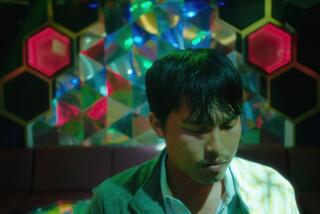Review: The Tim Burton magic is back with ‘Miss Peregrine’s Home for Peculiar Children’
- Share via
You could say that the new Tim Burton movie is perfectly in line with his sensibility, though that would be a bit like saying it was shot in focus. Given that this director’s visual and thematic preoccupations are as recognizable as those of any filmmaker working in Hollywood, you would be hard pressed to name the last Burton movie that wasn’t perfectly in line with his sensibility — that didn’t offer up some fanciful configuration of gifted loners, menacing monsters, witchy women, Johnny Depp, the spirit realm and, of course, acres upon acres of fabulously morbid production design.
Even his previous picture, the biographical drama “Big Eyes,” turned out to be a garishly hued live-action fairy tale about the liberation of a shy, misunderstood artist. The live-action Burton film that preceded it, “Dark Shadows,” was an extravagantly empty postmodern artifact, a 1970s occult emporium in search of a narrative engine. Indeed, the consistency of Burton’s interests of late has been matched only by the lackluster quality of his output, spurring more than a few of his longtime admirers to wonder if, amid all the fantastical worlds he has left to build, he might have any decent stories left to tell.
Not least among the unexpected pleasures of “Miss Peregrine’s Home for Peculiar Children,” adapted from Ransom Riggs’ celebrated 2011 young-adult novel, is that it lays those fears at least temporarily to rest. Though its cabinet-of-wonders aesthetic and meticulously appointed visuals announce it as a Burton movie through and through, this is easily the director’s finest work since his masterful 2007 screen adaptation of “Sweeney Todd,” and a striking reminder of what an unfettered gothic imagination can achieve with the right focus and an infusion of discipline.
It’s surely no coincidence that both “Sweeney Todd” and “Miss Peregrine’s Home for Peculiar Children” are distinguished by their exceptionally strong source material. Riggs’ book, in particular, notably integrated a series of eerie vintage photographs into its narrative, but that innovation aside, it rests comfortably alongside other classic tales of alienated youths who abandon their humdrum lives and vanish into far-flung realms of the absurd and macabre.
The maladjusted teenager in this case is a Florida boy named Jake Portman (Asa Butterfield, “Hugo”), who has little use for his inattentive parents (Chris O’Dowd and Kim Dickens) but adores his wily grandfather, Abraham (Terence Stamp), who has long enraptured Jake with stories about his extraordinary globe-trotting pursuits as a young explorer.
Naturally, the boy will be given a chance to follow in his grandfather’s footsteps, though not until after tragedy suddenly strikes, under strange circumstances that require Jake and his father to journey to Wales, where the young Abraham once lived in the ramshackle house that gives the story its title.
The sudden shift from bland Florida sunshine to a cold, gray world of rocky coasts and overcast skies — a difference that registers powerfully in Bruno Delbonnel’s lovely, enveloping cinematography — is almost immediately transporting. The mood grows more enchanting still when Jake stumbles through a cave and finds himself whisked back in time to Sept. 3, 1943, landing on the doorstep of the formidable Miss Peregrine (Eva Green) and the orphanage she’s established for mysteriously gifted children, also known as “peculiars.”
Some of the members of this makeshift family are little more than consistently charming sight gags: an invisible boy, a girl with a second set of jaws. Others, like Enoch (Finlay MacMillan), a surly lad with a talent for reanimating the dead, come straight from the novel but nonetheless feel like direct emanations from Burton’s subconscious. Still others — like Olive (Lauren McCrostie), who can conjure fire from her fingertips, and Bronwyn (Pixie Davies), who possesses superhuman strength — may remind you of the similarities between these peculiars and their more famous comic-book equivalents, the X-Men.
Perhaps it’s no coincidence that the novel was adapted by Jane Goldman, who co-wrote “X-Men: First Class” and received a story credit for its time-hopping sequel, “X-Men: Days of Future Past.” “Miss Peregrine’s Home for Peculiar Children” pulls off some similarly intricate temporal loop-the-loops, as Jake and his friends seek to ward off an evil presence stalking them through time and space. The precise mechanics of how time works in this parallel realm, complicated by the trauma and panic of the Second World War, should be left to the viewer to discover; suffice to say that admirers of “Groundhog Day” and “Edge of Tomorrow” will surely appreciate the film’s moderately less head-spinning variation on the same premise.
You might laugh when a villainous, white-eyed Samuel L. Jackson arrives to chew the scenery (and who can blame him, given the exquisite care evident in Gavin Bocquet’s production design), earning an honest paycheck alongside Allison Janney, Judi Dench and others who turn up to stamp the proceedings with their thespian Good Housekeeping seals. And when Jake first catches glimpse of a tentacle-tongued monster called a hollowgast, your terror may be held in check by your efforts to catalog its aesthetic lineage (my own mind was sent racing back to the sandworms from Burton’s “Beetlejuice,” by way of “Little Shop of Horrors”).
But the recognition of Burton’s whimsical sense of artifice is one of this movie’s chief pleasures, and it’s crucially lent a sense of emotional ballast by the director’s deep investment in the material. Set pieces that in other hands would feel like soul-deadening displays of CG prowess — the excavation of a sunken ship, a massive fight on a crowded public pier — instead feel like the wondrous stirrings of a young boy’s imagination. The sense of film craft here is so delicate and assured that, even at its most razzle dazzle-prone moments, the movie never seems to be straining for effect.
Green, such a memorably witchy presence in “Dark Shadows,” cuts a marvelous figure here as the raven-haired, shape-shifting Miss Peregrine, who smokes a pipe and wields a crossbow with the same deadly sangfroid. The feeling that courses between her and her young charges, much like the affection that binds Jake and Abraham, is understated yet impossible to miss. Sympathy for the misfit is one of Burton’s perennial themes, but it has been a while since he tapped into it with such a genuine and bittersweet sense of solace.
The film might have added a few more beats to the delicate love story between Jake and Emma (the luminous Ella Purnell), a peculiar so light and airy that she has to wear metal shoes to keep from floating away. The sight of Jake gently leading Emma around on a rope, as though he were flying a balloon, is not just a sublimely lyrical image but also a fine metaphor for creative flight. Perhaps only when the imagination is tethered to earthly reality can it really, truly soar.
------------
‘Miss Peregrine’s Home for Peculiar Children’
MPAA rating: PG-13, for intense sequences of fantasy action/violence and peril
Running time: 2 hours, 7 minutes
Playing: In general release
See the most-read stories in Entertainment this hour »

The trailer for Tim Burton’s “Miss Peregrine’s Home For Peculiar Children,” starring Eva Green.
ALSO
How ‘Miss Peregrine’ screenwriter Jane Goldman turned her quirks into a golden Hollywood career
New York City launches $5-million fund for women in film and theater, a first in the U.S.
Nate Parker addresses sexual assault charges on ’60 Minutes’: ‘I don’t feel guilty’
More to Read
Only good movies
Get the Indie Focus newsletter, Mark Olsen's weekly guide to the world of cinema.
You may occasionally receive promotional content from the Los Angeles Times.











